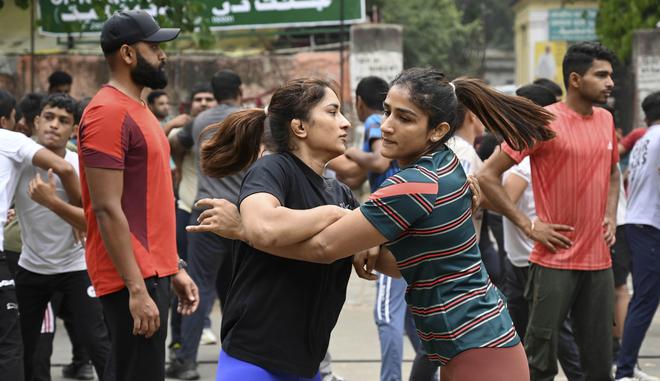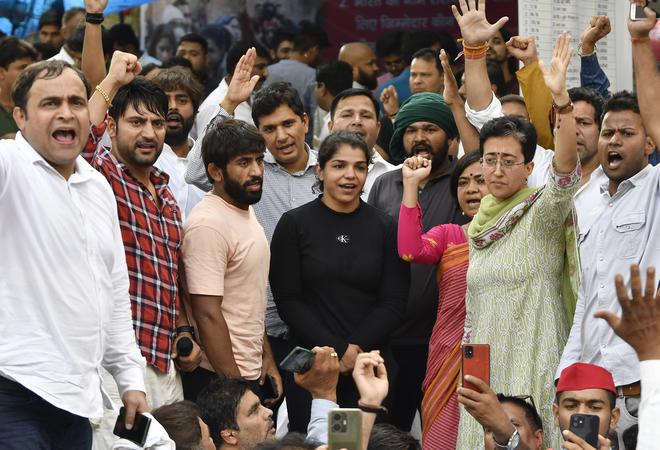It is a day of relative peace after a night of chaos. At around 10 a.m. on May 4 in New Delhi, Vinesh Phogat, the first Indian woman wrestler to win gold in both the Commonwealth and Asian Games, sits cross-legged on a chequered mattress in Jantar Mantar, the official protest site in the capital. She is teary-eyed and exhausted. Sitting beside her are Sakshi Malik and Bajrang Punia, both Olympic medallists. Mediapersons mill around the 200-metre mattress-filled stretch, which has been heavily barricaded by the Delhi Police.
It was allegedly because of the mattresses that an altercation unfolded the previous night between the police and the protesters. The capital has seen some unusually heavy rains in May. The protesters have said they are forced to sleep on damp mattresses. On May 3, Aam Aadmi Party (AAP) MLA Somnath Bharti decided to “make it a little easier for them” by providing foldable cots. The police stopped him saying permission had not been sought for the cots. The police alleged that when they intervened, the supporters tried to forcibly remove the cots from the truck, which led to a scuffle that left five officers injured. Punia claimed that the police manhandled and abused the wrestlers.
But this conflict over cots is a minor battle in a larger war that the wrestlers have been fighting for days. They have been sitting in protest — for the second time round — since late April against Wrestling Federation of India (WFI) president Brij Bhushan Sharan Singh, who has been accused of sexual harassment. “Our safety is at stake,” says Phogat. “We want Prime Minister Narendra Modi and Home Minister Amit Shah to acknowledge our concerns, which are grave.”
After nearly a week of protest, some action was taken against Singh. Seven women, including a minor, had complained against him at the Connaught Place police station. According to deputy commissioner of police (New Delhi) Pranav Tayal, one FIR was registered on the minor’s complaint under the Protection of Children from Sexual Offences Act and relevant sections of the Indian Penal Code (IPC). Another FIR was registered on the complaint of adult wrestlers under Sections 354A (sexual harassment) and 354D (stalking) of the IPC.
A demand and a dream
The wrestlers say filing an FIR won’t do; they demand Singh’s arrest. They have around 200-300 supporters at Jantar Mantar daily: khap (community) leaders, farmers, budding wrestlers and their parents and, lately, students from Delhi University. At night, around 25 protesters camp at the site, including Punia, Phogat, and Malik. They allege that the Central government has restricted water, electricity, and the number of mattresses at the site — all in a bid to wear down the protesters and ensure that they have fewer supporters.
Sometimes, people donate water bottles. And at night, when there is no electricity, the protesters use their mobile flash lights to move around. Every day, one protester is responsible for taking all their mobile phones to get them charged in cars or the Janata Dal office nearby.

Supporters at the site wake up at 5 a.m. Among them is Rishabh, 15, a resident of Sonipat in Haryana. A school-going boy with a passion for wrestling, Rishabh has been sitting at the site for days along with his 50-year-old coach, his father who is a farmer, and fellow athletes. When asked why he is there, Rishabh simply says, “My friends shouldn’t fear playing any sport.”
Practice then begins. “ Chalo, shabash, bhago (C’mon, excellent, run),” says a coach, as wrestlers begin with their warm-up. But it is not easy to stretch, do squats or push-ups on the road.
Practice ends at 8 a.m. The budding wrestlers are then served almonds, juice, milk, ghee, and water in which black raisins are soaked, says Rishabh. The ingredients are sourced by the farmers in bulk from Haryana and Ghaziabad, in Uttar Pradesh.
For the protesters, the agitation is a demand for justice. For Rishabh and his friend Aditya, who have the same ask, these morning practices are also, strangely, a dream come true, for they are being trained for the first time by their heroes, Phogat and Punia.
By 9 a.m., everybody has a bath. There are toilets at the two ends of the protest site. “We wash the floors ourselves,” the wrestlers claim.
An hour later, a breakfast comprising dalia (cracked wheat), omelette, bread, paneer, kheer, and chana is served, again brought by the farmers and other supporters. Shahrukh Khan, a 30-year-old man from Rajasthan, says he comes to the site whenever he gets a day off from work. “If we don’t come here, who will stand with our sisters?” Khan says. “These allegations are serious.”
A divided house
The gravity of the allegations became clear on January 18, when the first round of protests began at Jantar Mantar. The Indian Olympic Association (IOA) and the Union Sports Ministry tried to pacify the wrestlers with assurances that there would be a probe into their allegations. Back then, other prominent wrestlers including Anshu Malik, Ravi Dahiya, Sonam Malik, and Deepak Punia showed their support at the protest site or by releasing videos. The IOA formed an internal committee, which was headed by M.C. Mary Kom, to probe the allegations.
A few days later, under the directions of Anurag Thakur, Union Minister of Youth Affairs and Sports, an Oversight Committee was formed, also under Mary Kom, and was asked to submit its report to the Sports Ministry. The protest was called off.
The Committee submitted its report on April 5. The Ministry has not made the Committee’s findings public. But the Committee, said the Ministry, found that the WFI did not have a proper system to address such complaints and also called for transparency and communication between the WFI and the sportspersons.
Citing the Oversight Committee’s delay in releasing the report and their loss of faith in the probe, Phogat, Punia, and Malik went on protest again demanding that Singh, the Bharatiya Janata Party (BJP) MP from Kaiserganj, be arrested and removed from all positions of power. The three of them claim that they continue to receive support from other wrestlers, but that such support is not public this time since the athletes “fear consequences.” Delhi Chief Minister Arvind Kejriwal, Congress leader Priyanka Gandhi Vadra, and sports personalities such as Abhinav Bindra, Neeraj Chopra, and Sania Mirza have publicly supported the protesters.

In an address to the supporters at Jantar Mantar, Phogat said that the Committee has not responded to the protesters regarding its findings. “It has been three months. The Sports Ministry and the Committee members don’t pick up our calls. Why are the findings not public?” she said.
Meanwhile, there has also been criticism of the protesters. IOA president P.T. Usha rebuked the wrestlers for taking to the streets. “The IOA has a committee and an athletes’ commission. Instead of going to the streets [again], they should have come to us, but they have not,” she said. After receiving backlash for her comments, she met the protesters at Jantar Mantar and assured them of support.
In order to run the day-to-day affairs of the WFI, the Sports Ministry instructed the IOA to constitute an Ad-hoc Committee. IOA Joint Secretary Kalyan Chaubey also said that the IOA investigation is under way with many witnesses yet to appear before the committee formed in January.
Meanwhile, Singh has likened the agitation to the Shaheen Bagh protests that took place against the Citizenship (Amendment) Act. He has alleged that the target of the protest is not him but the BJP, and that a few families and women who have levelled allegations against him belong to the same akhada (traditional wrestling academies with training facilities) whose patron is Congress MP Deepender Hooda, the son of Haryana’s former Chief Minister, Bhupinder Hooda.
“Wrestling activities have come to a standstill over the last four months. I say, ‘Hang me,’ but don’t stop wrestling activities and don’t play with the children’s future,” he said during an interaction with the media.
Singh believes that resigning would amount to an acceptance of the allegations. “Resignation is not a big deal, but I am not a criminal. My tenure is almost over. The government has formed a three-member committee. Elections [to the WFI] will be held in 45 days and my term will end after that,” he said in another media interaction.
Women empowerment
At the protest site, where mikes are rented, a speaker talks about how the BJP’s ‘Beti Bachao, Beti Padhao’ programme has not helped the country as women continue to fight against harassment. A massive red banner tied to two trees reads, “Legal action must be initiated against sexual harassment.” On it is a photograph of Singh photoshopped behind bars. The speeches by the three wrestlers and the supporters, which are made in Hindi, English, Punjabi, and Haryanvi, also talk about women empowerment and how women don’t feel safe in the country. “ Humari beti, humari behen (Our daughters, our sisters)” is a common refrain.
The wrestlers have also put up a white flex board, which lists 38 criminal charges against Singh, including of murder, attempt to murder, rioting, criminal intimidation. The board also cites the Uttar Pradesh Gangsters and Anti-Social Activities (Prevention) Act, 1986, as well as the Arms Act, 1959.
Somveer Kadian, 25, a wrestler from Haryana’s Hisar, says the wrestlers have arranged for tents, bedsheets, mattresses, fans, speakers, microphones, a mini power generation set and water and food with their own money.
In his recent Instagram video, Punia said, “They are trying to break us. And this is not about competition or participating, it is about sexual harassment.”
While the rains have now stopped, the damp soil and mosquitoes make it difficult for the wrestlers to sleep on the footpath. Malik, who has slathered mosquito repellent cream on herself, holds onto a police barricade and says, “When we receive medals, there is celebration. But when we question the system, why do they question us?” Her husband Satyawart Kadian, a Commonwealth Games medal-winner in wrestling, has been supporting her since the first day of the protest. “We are not leaving until every single girl receives justice,” Kadian says.
At 9 p.m., with the top wrestlers having gone to bed, it is the budding wrestlers who take care of everyone. They distribute packaged thalis, which contain portions of rice, dal, dry sabzi, curd and a tiny gulab jamun, enough for one person for the night. The thalis and the food change every day depending on what the farmers procure. “Nobody here should sleep on an empty stomach. There is enough food for everybody,” says Rahul Yadav, a wrestler from Ghaziabad. Food packages are also distributed to supporters, mediapersons, police personnel, and beggars who stand on the other side of the barricade.
The supporters at the site say banter between the wrestlers continues till 12.30 a.m. daily. They discuss their future, their life partners, and what this protest means for them. But every day is a battle. Speaking to the media, Phogat said, “To fight this battle, we have put our entire career and families at stake. Our only demand is that Singh should be arrested. Because the allegations are grave, we are going to sleep and eat here till we receive justice.”
Suraj Lather, 29, a Karnal-based strength and conditioning coach for the wrestlers, says wrestling is a challenging sport and the wrestlers who are protesting against the WFI chief will not move an inch. “We have left our families back home to join this fight for our sisters. They cannot break our spirit. The women fear consequences pertaining to their career and society. If we don’t sit here, who will?”







